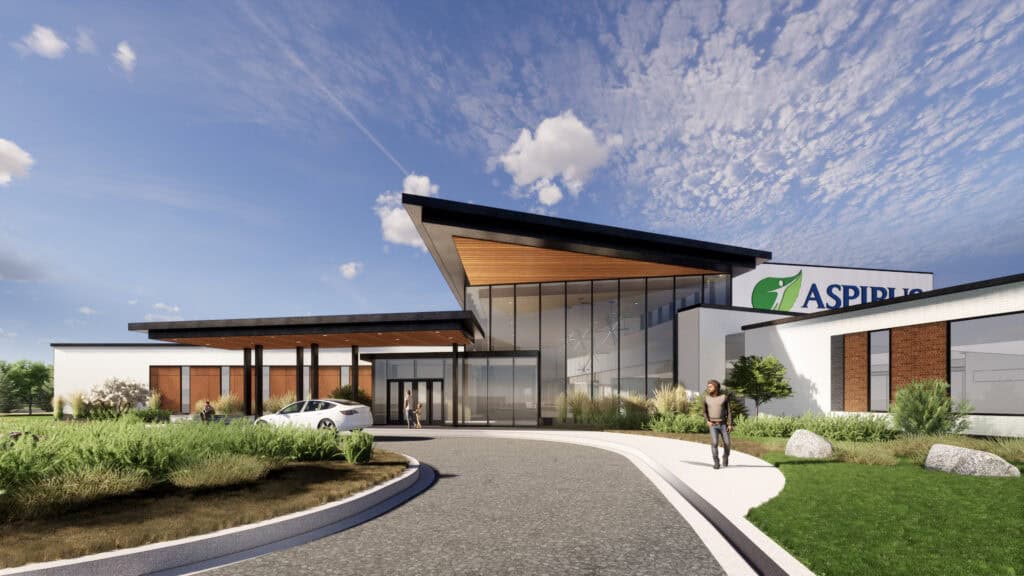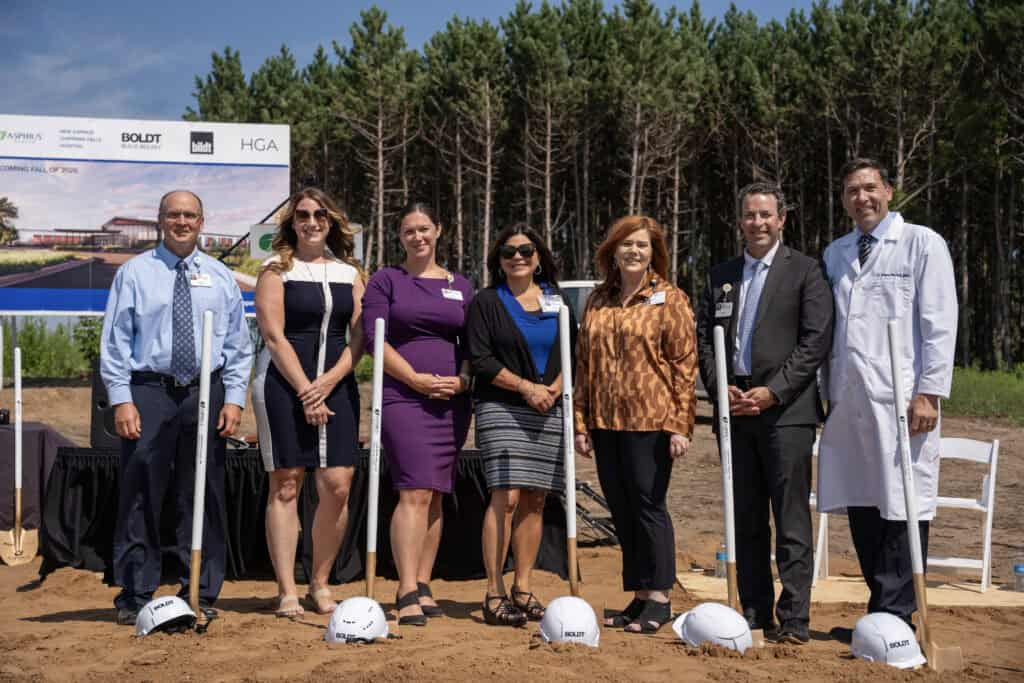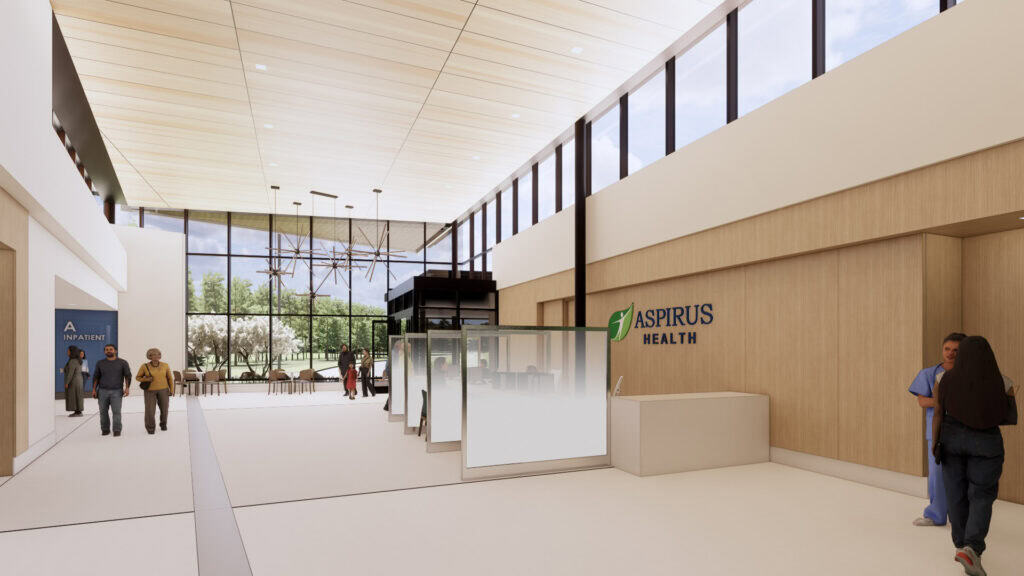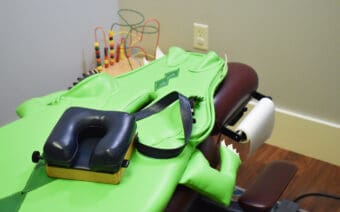
September 29, 2025
CHIPPEWA FALLS – Since the 2024 closures of two hospitals – one in Chippewa Falls, the other in Eau Claire – Jason Troxell, president of Aspirus’s Northwest WI Region, said West Central Wisconsinites have faced a relative lack of treatment options.
In response, Troxell said his health system is taking action – starting with breaking ground on a new hospital and clinic on Chippewa Crossing Boulevard in Chippewa Falls.
Troxell said the 35,000-square-foot facility is expected to be completed by September 2026, and the Aspirus team is eagerly anticipating its opening.
“We’re excited to expand into that market, knowing there’s a need and knowing that we can meet the need,” he said. “And we’re excited about the patient care that we bring: very high standards, high quality, very compassionate, with a focus on the patient.”
A closer option
With the nearest hospital currently being a 20-minute drive from Chippewa Falls, Troxell said Aspirus had considered bringing its services to the market even before the hospital closures.
“When we saw those two hospitals closed, we decided to act in order to provide the needed services for that community,” he said.
Of particular importance, Troxell said, was cutting down the 20-or-more-minute transport for emergency care.
“And those emergency departments [in neighboring cities] were pretty full with the closure of the two hospitals, so the waits were quite a bit longer than the community was used to,” he said. “So, we felt like [Chippewa Falls] was a market that we could provide health care to, that was in need of it – especially emergency care, primary care and inpatient care.”
To help meet immediate healthcare needs and allow patients to stay closer to their respective communities, Troxell said Aspirus expanded access at a number of its hospitals, bringing on additional nursing staff and increasing its census at Aspirus’ Wausau, Medford and Stanley hospitals, as well as others.
“It was around that time as well that [leadership] began looking at, ‘Do we open a hospital in this market?’” he said. “The decision was announced to open [a Chippewa Falls facility] in 2024. We plan to open this hospital fairly quickly.”

‘This is new for us’
After deciding to establish a facility in the region – bringing Aspirus’s total across Wisconsin, Minnesota and Michigan to 18 – Troxell said one of the first considerations was whether to purchase and renovate one of the existing, recently closed hospitals.
“There was some consideration [of that option],” he said.
However, after analyzing the vacant facilities and reviewing the market, Troxell said Aspirus leadership came to two conclusions.
“One, it would have been extremely expensive to modernize those buildings and bring them up to our Aspirus standards,” he said. “And two, the market really didn’t support that style of hospital, which is partly why [they] closed.”
Primarily, Troxell said those facilities had “more than 60 [hospital] beds,” and were deemed too large to sustain operations.
“Some health systems operate a little differently, where they are seeking to move patients to the large facility in order to keep that facility full, [whereas] ours are already very full, so we’re trying the opposite,” he said. “We’re trying to keep as many patients local as possible – provide and enhance the care locally, so they can stay close to home, so their family members can see them and be close to them.”
Though acquiring and updating existing buildings has worked well for Aspirus in the past, Troxell said the more practical approach has typically been converting clinics into hospitals. Constructing a facility from the ground up, he said, is unprecedented for Aspirus – “this is new for us.”
“But with the plan we have going into the market, we have a multi-phase approach [so] we can launch this hospital as fast as possible, provide the emergency care to the market as quickly as possible, be able to sustain that size,” he said, “and if we grow – which we do expect to happen – then we would expand the facility.”
Per the health system’s press release, the facility’s first phase will deliver an emergency department with 10 treatment rooms, 10 inpatient beds, an on-site clinic with 12 treatment rooms, imaging services (X-ray and CT), laboratory services and a pharmacy.
Another first for Aspirus, Troxell said, regards the construction methods to be used in Chippewa Falls.
Troxell said this is the first time Aspirus is doing a modular build approach – “where the ER rooms, the inpatient rooms [and] the clinic rooms are built off site and then brought onto the site and put together almost like Legos.”
“The entire facility is not built that way,” he said. “There is some traditional construction as well, but doing that modular approach to the build and then putting it together on site allows us to save a lot of time, so that we can get to the market sooner.”
Troxell said the method will allow the facility to start “providing that care a couple months earlier,” and help achieve the goal of serving patients next September.
Furthermore, he said the new construction allowed Aspirus to select a scenic location.
“The building will be beautiful, and it sits basically within nature – there are forests and trees around the facility,” he said. “We’ve designed it so it can be a healing environment that way, and the design of the facility will be very welcoming to our patients in the community.”
Present, future challenges
With the new facility comes the need for additional staff, and Troxell said Aspirus has already begun the recruitment process – though he acknowledged staffing remains a significant challenge across the healthcare industry.
Long-term, permanent employees are ideal for hospitals, Troxell said – however, when positions linger unfilled, health systems seek “contract or traveling staff who may come from a couple hours away, or even further, to come and provide care” – a method “much more costly than having permanent staff.”
“Staffing is always a challenge to meet the needs of the community and the patients,” he said. “It’s especially true for larger PPS (prospective payment system) hospitals, but also just as true for rural hospitals, where it might be more difficult to find permanent staff.”
Sufficient technical support staff, Troxell said, is another hiring challenge for health systems, often overlooked compared to physician/provider shortages.
Fortunately, Troxell said Aspirus has thus far sustained success amid these challenges.
“In fact, this last year, Aspirus had its best recruiting year for hiring physicians and providers as well as support staff,” he said. “It was definitely challenging as we came out of COVID[-19] as an industry. It still is a challenge, but it is progressively getting better and better.”

The other significant challenge facing health systems, Troxell said, is a decline in federal reimbursement.
“In Medicaid, we’re seeing people, as they retire, are retiring in place – so they’re transitioning from a commercial insurance that is more highly reimbursed to us, to a government insurance like Medicare, where our reimbursement is lower,” he said.
However, health systems can continue to serve their patients with greater efficiency, Troxell said – which, perhaps paradoxically, he adds, often requires expansion.
Expansion, he said, is a way for larger health systems “to cover the reduction in reimbursement.”
Troxell said this is something that’s “going to be extremely difficult for rural facilities” that aren’t connected to a health system.
“The reason you see bigger and bigger health systems is if you’re by yourself, out in a rural community, and you don’t have the support of a bigger system that can help you with the cost of IT, HR, legal, supply chain and revenue cycle reimbursement, it becomes very, very expensive, and then your reimbursement is going down because of the declining reimbursement in Medicare and Medicaid,” he said.
Still, Troxell said any of the struggles associated with the industry is well worth it, as it all amounts to “a very rewarding career.”
“If people are considering going into health care, listen to this: You really get to help – intangibly help – people in your community,” he said. “The people at our hospitals… are people from the community, their friends, their loved ones… and being able to care for them in their time of need is extremely rewarding. That part of health care is a beautiful thing, and it’s wonderful to be a part of that even if you’re not a caregiver by the bedside.”
Making a difference
Based on Aspirus’ past successes in opening hospitals, and with a plan to train employees at its Stanley hospital, Troxell said he is confident “the day we open the doors [of the new Chippewa Falls hospital/clinic], we can provide excellent patient care.”
“We want to provide a wonderful, quality experience that people tell their friends about, people come back to and feel like ‘here’s a place that cares for me, here’s a place that is going to give me good quality care and get me home as soon as possible’ – because nobody wants to be in the hospital, right?” he said. “It’s exciting. I do believe there’s a difference with Aspirus, and the [Chippewa Falls] community will experience that difference when we’re there in about a year.”
 Green Bay native named as Schreiber’s next president/CEO
Green Bay native named as Schreiber’s next president/CEO Feeding customers in a relaxed setting for 90 years
Feeding customers in a relaxed setting for 90 years








